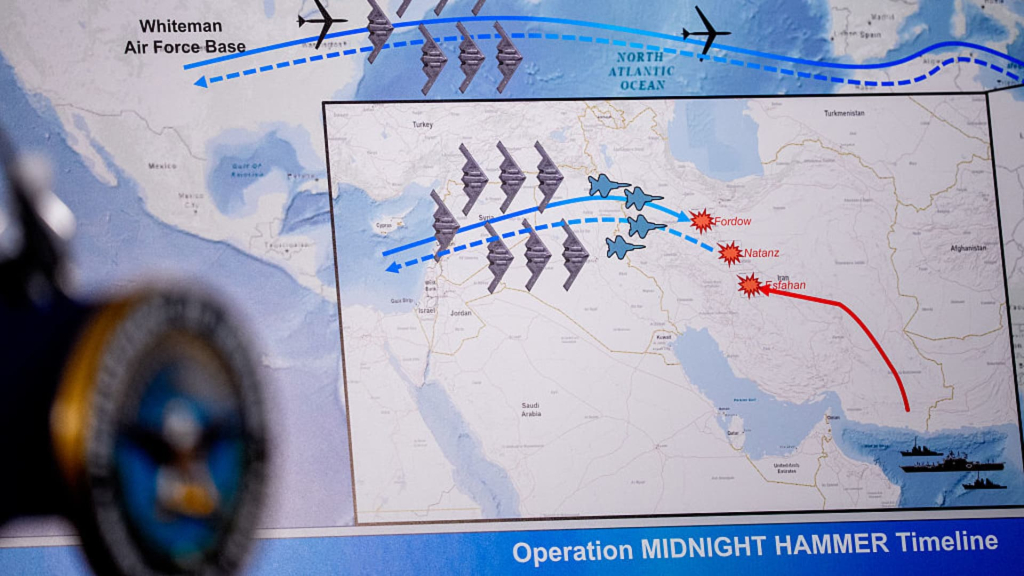The last day has represented a turning point in the ongoing Israel-Iran conflict, marked by the United States’ entry into the war — a development that has triggered concern among investors and global leaders alike.
On Saturday evening, U.S. B-2 Spirit stealth bombers, supported by submarines, targeted three of Iran’s key nuclear facilities: Fordo, Natanz, and Isfahan.
This marked the first direct military action taken by the U.S. against Iran since Israeli airstrikes earlier in June, which had already escalated tensions by eliminating significant Iranian military figures and nuclear experts.
The ensuing days have witnessed a surge of global reactions to the strikes, particularly from Iranian officials, who have condemned them as “outrageous” and promised “everlasting consequences.” Iran’s parliament is also considering a closure of the critical Strait of Hormuz, a key artery for global energy supplies.
Below is a summary of the unfolding situation and its potential implications.
U.S. Engages in Israel-Iran Conflict
At 7:50 p.m. Eastern Time, President Donald Trump took to Truth Social to announce that the U.S. had executed a “very successful attack” on the nuclear sites, urging that “NOW IS THE TIME FOR PEACE!”.
An hour later, a U.S. official confirmed to Reuters that B-2 Spirits played a pivotal role in the bombings, being the only aircraft capable of delivering munitions strong enough to penetrate the underground site at Fordo.
The International Atomic Energy Agency (IAEA) subsequently verified that all three locations were struck.
Global leaders responded swiftly; among them, Israeli Prime Minister Netanyahu thanked Trump for the operation, calling it a “bold decision.”
The IAEA announced two subsequent updates, indicating that Director General Rafael Grossi would convene an emergency Board of Governors meeting to address the strikes. The agency also reported communication from Iranian authorities asserting that radiation levels had not increased following the attacks.
The United Nations Security Council convened on Sunday to deliberate the incident, with Russia, China, and Pakistan advocating for a resolution demanding an immediate ceasefire across the region.
In a vigorous condemnation, China’s U.N. Ambassador Fu Cong criticized the U.S. actions against Iran and its nuclear installations at the UNSC meeting on Sunday.
While U.S. officials, including Vice President JD Vance and Defense Secretary Pete Hegseth, emphasized that the strikes were not intended to effect regime change in Iran, President Trump invoked the possibility, stating on Truth Social that it was arguably time for such a change if the current regime could not “MAKE IRAN GREAT AGAIN.”
Oil Prices Surge Following Hormuz Closure Warning
In the wake of these developments, oil prices surged over 2% on Sunday evening, approaching $80 per barrel for Brent crude and nearing $75 for West Texas Intermediate crude.
This spike followed reports that Iran’s parliament backed a closure of the critical Strait of Hormuz, through which approximately 20% of the world’s oil is transported. The U.S. Energy Information Administration has labeled it the “world’s most important oil transit chokepoint.”
Nevertheless, Iran’s national security council is ultimately responsible for any decision regarding the Strait’s closure.
As it stands, the Strait remains open; however, analysts have warned that should Iran move to close it and Western nations attempt to intervene militarily, oil prices could spike to $100 per barrel.
U.S. Secretary of State Marco Rubio called for China on Sunday to work towards preventing Iran from taking such action, given that China is Iran’s largest export market for oil and has maintained a cordial relationship with the nation.
Preparing for Iran’s Retaliation
Global attention now shifts to Iran’s anticipated response. Iranian Foreign Minister Abbas Araghchi stated via X that Iran “reserves all options” for retaliation against the U.S. strikes.
Labeling the attacks as outrageous, Araghchi asserted that they would have “everlasting consequences.”
Iranian Deputy Foreign Minister Majid Takht Ravanchi conveyed, in remarks to German media, that Iran would persist with its uranium enrichment activities, stating, “no one can tell us what to do,” according to reports from Iranian media.
Shane Oliver, chief economist and investment strategy head at Australian bank AMP, commented in a Monday briefing that a minimal Iranian response could stabilize oil prices and boost shares, similar to the U.S.-led interventions in previous Gulf Wars.
Conversely, should Iran escalate hostilities by targeting U.S. bases, a significant U.S. retaliation could follow, perpetuating market volatility.
Vandana Hari, founder of energy intelligence firm Vanda Insights, stated during Finance Newso’s “Squawk Box Asia” that the likelihood of Iran closing the Strait is “minimally realistic.” She asserted that such an act could alienate Iran from its neighbors and key customers, like China, responsible for a significant portion of Iranian oil exports.
According to Hari, the potential self-inflicted damage of closing the Strait may far outweigh any benefits for Iran.


























